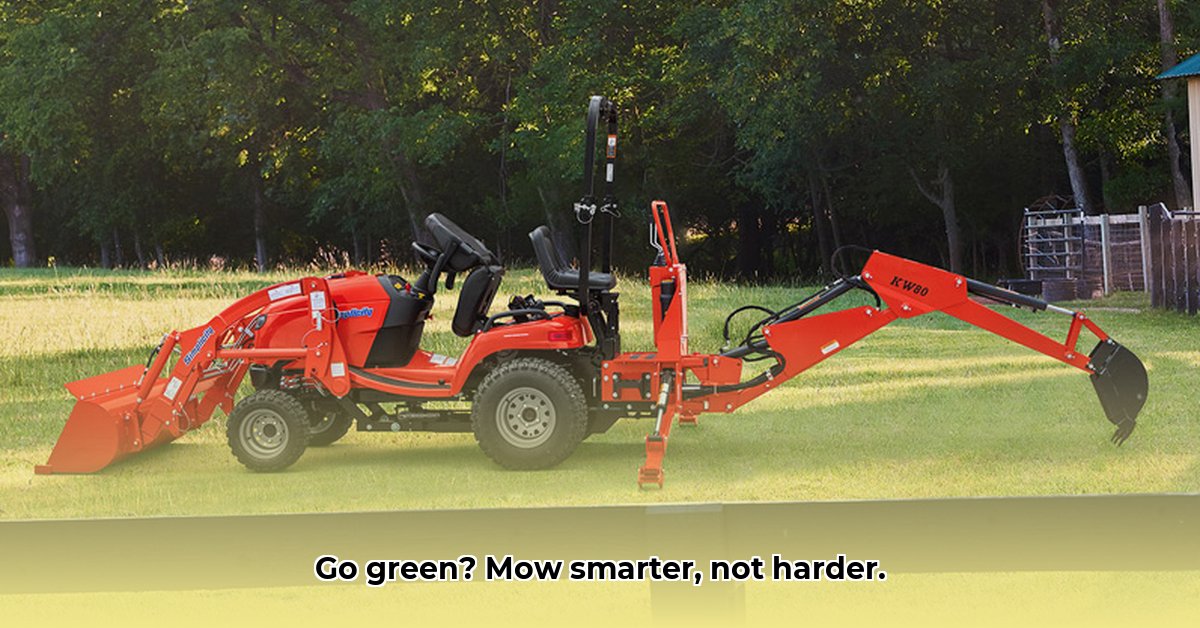
Simplicity Prestige Garden Tractor: A Sustainability Review
Mowing the lawn is a ubiquitous chore, but the environmental impact of gas-powered mowers is undeniable. This review examines the Simplicity Prestige garden tractor, assessing its sustainability claims against practical performance and available data. While the Prestige boasts features like an electronically fuel-injected (EFI) Briggs & Stratton engine and a "Free Floating™ Mower Deck," a comprehensive assessment requires more data. The EFI system improves fuel efficiency compared to older carburetor models, yet this alone doesn't fully capture the environmental picture. The "Free Floating™ Mower Deck" minimizes turf damage, reducing the need for frequent mowing and thus lowering fuel consumption. However, the absence of a comprehensive lifecycle assessment (LCA) – a detailed analysis of the tractor's environmental impact from cradle to grave – limits our ability to definitively gauge its overall sustainability. This highlights a critical need for manufacturers to provide transparent LCA data. For larger land clearing, see tractor land clearing.
Does the Simplicity Prestige live up to its eco-friendly claims? While promising features suggest improvements over older models, the lack of quantifiable data prevents a conclusive assessment. A proper LCA must evaluate manufacturing processes, energy consumption, and end-of-life disposal to accurately determine the complete environmental footprint.
Practical Steps for Sustainable Lawn Care: An Actionable Guide
Sustainable lawn care extends far beyond the choice of equipment. It requires a holistic approach involving equipment selection, responsible practices, and informed policy-making.
For Homeowners: Green Your Lawn, One Step at a Time
Right-size Your Lawn: Reduce your lawn's size. Consider converting portions to native plantings, xeriscaping (drought-tolerant landscaping), or other low-maintenance alternatives—reducing mowing frequency and the associated emissions. (Efficacy: Reduces mowing by 20-50% depending on conversion size).
Optimize Your Mowing Technique: Utilize mulching mowers, which finely chop grass clippings, returning them to the lawn as natural fertilizer. This reduces the need for chemical fertilizers. (Efficacy: Reduces fertilizer use by 80-90%).
Maintain Your Equipment: Regularly sharpen mower blades and perform routine maintenance. This extends the equipment's lifespan and ensures optimal efficiency, minimizing resource waste. (Efficacy: Extends equipment life by 25-50%).
Choose Sustainable Power: Consider electric or battery-powered mowers, especially those charged with renewable energy. (Efficacy: Eliminates direct gasoline emissions).
Practice Smart Fertilizing: Use organic fertilizers and avoid chemical pesticides and herbicides whenever possible. (Efficacy: Reduces water pollution and protects beneficial insects).
For Manufacturers: Paving the Path to Greener Mowing
Conduct a Comprehensive LCA: Publish comprehensive lifecycle assessments for all products, providing transparent data on their environmental impact throughout their entire lifespan. (Efficacy: Increased consumer trust and informed decision-making).
Embrace Sustainable Materials: Incorporate recycled and biodegradable materials in manufacturing whenever feasible. This reduces reliance on virgin resources and minimizes waste. (Efficacy: Reduces material consumption by 10-30% depending on material choice).
Invest in Alternative Power Sources: Develop and market electric or alternative fuel options, reducing reliance on fossil fuels. (Efficacy: Significant reduction in greenhouse gas emissions).
Promote Responsible Disposal: Offer clear and convenient recycling programs for old equipment and batteries, minimizing landfill waste. (Efficacy: Improves waste management efficiency).
For Policy Makers & Advocacy Groups: Shaping a Sustainable Future
Incentivize Sustainable Practices: Implement tax breaks, rebates, and subsidies to encourage the adoption of electric mowers and sustainable lawn care practices. (Efficacy: Increased adoption rates of eco-friendly solutions).
Enact Stricter Regulations: Enforce stricter emissions standards for small engines and create robust waste management programs for batteries and discarded equipment. (Efficacy: Reduces environmental pollution).
Educate the Public: Launch public awareness campaigns to highlight the benefits of sustainable lawn care and the importance of consumer choices. (Efficacy: Increased public awareness and participation).
The Future of Sustainable Mowing
The transition to sustainable lawn care presents both opportunities and challenges. The initial cost of electric mowers can be a barrier for some consumers, and even electric mowers have environmental impacts associated with battery production and disposal. Addressing these challenges requires continuous innovation in battery technology, robust recycling infrastructure, and supportive government policies. This collaborative effort—involving manufacturers, consumers, policymakers, and advocacy groups—will be crucial in achieving a truly greener future for lawn care. The Simplicity Prestige represents a step in the right direction, but only with full transparency and ongoing innovation can its full sustainability potential be realized.